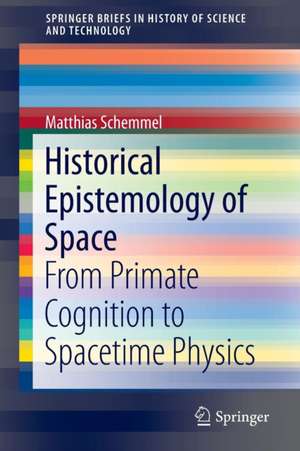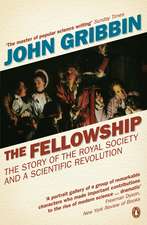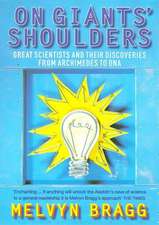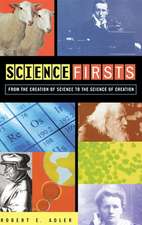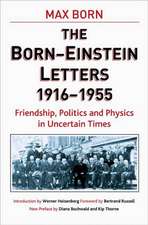Historical Epistemology of Space: From Primate Cognition to Spacetime Physics: SpringerBriefs in History of Science and Technology
Autor Matthias Schemmelen Limba Engleză Paperback – 16 dec 2015
What do the orientation of apes and the theory of relativity have to do with each other? Readers will learn how different forms of spatial thinking are related in a long-term history of knowledge. Scientific concepts of space such as Newton’s absolute space or Einstein’s curved spacetime are shown to be rooted in pre-scientific structures of knowledge, while at the same time enabling the integration of an ever expanding corpus of experiential knowledge.
This work addresses all readers interested in questions of epistemology, in particular philosophers and historians of science. It integrates forms of spatial knowledge from disciplines including anthropology, developmental psychology and cognitive sciences, amongst others.
Din seria SpringerBriefs in History of Science and Technology
- 8%
 Preț: 387.78 lei
Preț: 387.78 lei -
 Preț: 377.18 lei
Preț: 377.18 lei -
 Preț: 443.75 lei
Preț: 443.75 lei -
 Preț: 377.35 lei
Preț: 377.35 lei -
 Preț: 377.35 lei
Preț: 377.35 lei -
 Preț: 378.34 lei
Preț: 378.34 lei -
 Preț: 379.09 lei
Preț: 379.09 lei -
 Preț: 378.34 lei
Preț: 378.34 lei -
 Preț: 377.73 lei
Preț: 377.73 lei -
 Preț: 448.21 lei
Preț: 448.21 lei -
 Preț: 377.35 lei
Preț: 377.35 lei -
 Preț: 408.66 lei
Preț: 408.66 lei -
 Preț: 478.33 lei
Preț: 478.33 lei - 20%
 Preț: 296.67 lei
Preț: 296.67 lei -
 Preț: 411.16 lei
Preț: 411.16 lei -
 Preț: 374.30 lei
Preț: 374.30 lei -
 Preț: 379.09 lei
Preț: 379.09 lei -
 Preț: 489.30 lei
Preț: 489.30 lei -
 Preț: 378.54 lei
Preț: 378.54 lei -
 Preț: 476.57 lei
Preț: 476.57 lei -
 Preț: 378.92 lei
Preț: 378.92 lei - 15%
 Preț: 461.87 lei
Preț: 461.87 lei -
 Preț: 442.83 lei
Preț: 442.83 lei -
 Preț: 446.08 lei
Preț: 446.08 lei -
 Preț: 379.48 lei
Preț: 379.48 lei -
 Preț: 379.86 lei
Preț: 379.86 lei -
 Preț: 344.53 lei
Preț: 344.53 lei -
 Preț: 378.92 lei
Preț: 378.92 lei -
 Preț: 376.04 lei
Preț: 376.04 lei -
 Preț: 347.41 lei
Preț: 347.41 lei -
 Preț: 324.70 lei
Preț: 324.70 lei -
 Preț: 377.35 lei
Preț: 377.35 lei -
 Preț: 444.35 lei
Preț: 444.35 lei
Preț: 378.54 lei
Nou
Puncte Express: 568
Preț estimativ în valută:
72.46€ • 78.73$ • 60.90£
72.46€ • 78.73$ • 60.90£
Carte tipărită la comandă
Livrare economică 21 aprilie-05 mai
Preluare comenzi: 021 569.72.76
Specificații
ISBN-13: 9783319252391
ISBN-10: 3319252399
Pagini: 117
Ilustrații: VIII, 117 p. 1 illus. in color.
Dimensiuni: 155 x 235 x 7 mm
Greutate: 0.19 kg
Ediția:1st ed. 2016
Editura: Springer International Publishing
Colecția Springer
Seria SpringerBriefs in History of Science and Technology
Locul publicării:Cham, Switzerland
ISBN-10: 3319252399
Pagini: 117
Ilustrații: VIII, 117 p. 1 illus. in color.
Dimensiuni: 155 x 235 x 7 mm
Greutate: 0.19 kg
Ediția:1st ed. 2016
Editura: Springer International Publishing
Colecția Springer
Seria SpringerBriefs in History of Science and Technology
Locul publicării:Cham, Switzerland
Public țintă
ResearchCuprins
1.The challenge of a historical epistemology of space.- 2. Natural conditions of spatial cognition.- 3. Culturally shared mental models of space.- 4. Social control of space and metrization.- 5. Context-independence of mental models resulting from reflection.- 6. The expansion of experiential spaces over history.- 7. The decline of an autonomous concept of space.- 8. Concluding remark.
Caracteristici
Introduces an epistemologically informed history of knowledge across different disciplines Discusses the societal and material conditions under which theories and spatial thinking develop Presents theoretical considerations & concrete results from both historical studies and empirical sciences Includes supplementary material: sn.pub/extras
